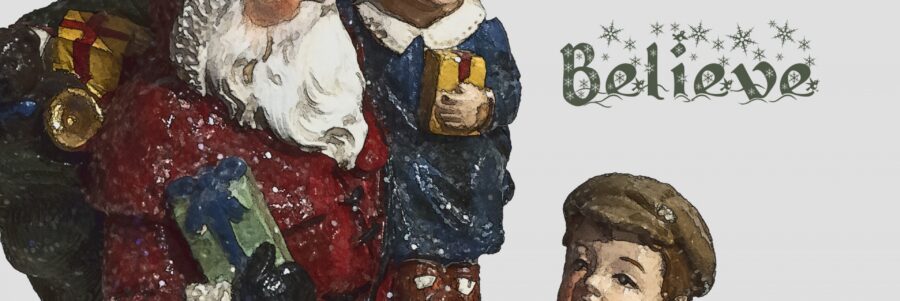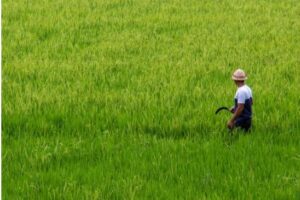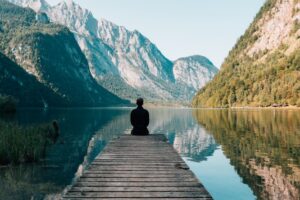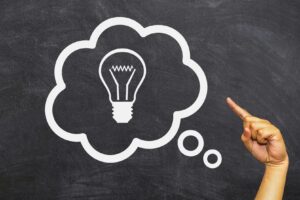March 2008

My dad was, among other things, a musician. He played piano and vibes and had his own jazz band in the forties. I grew up listening to Billie Holiday, Nat King Cole, Stan Kenton and others from my dad’s collection of 78 rpm records, and falling asleep to the beat of live jam sessions on the other side of a thin pocket door, into the night in our farmhouse living room.
He eventually had to give up music, or felt that he had to, in order to make a living to support my brother, two sisters, and myself. He became a welder and pipefitter, but never lost his dream of music. It was one of many disappointments in his expectations of life, the cumulative weight of which led to his gradually renouncing what was initially an idealistic world view, and developing an embittered outlook on life which stayed with him until alzheimer’s set in in his later years.
One of these incidents which I remember vividly from about my seventh year had to do with the records, which for us were a very valuable item in times of scarcity, as well as a great source of enjoyment in the days of radio-only. A supposed friend, a disc-jockey from Saint Louis (the “big city”), borrowed a bunch of the rare discs to play on the air. He never returned them. This incident helped to confirm my dad’s belief, as he later expressed it, that man is the foulest of all creatures on earth. By emphasizing the fact that he included himself in that judgment, he lent the indictment the air of impartiality.
The first verse of an old tune which I remember survived the betrayal, sung by Frankie Lane, is a poetic affirmation of belief:
I BELIEVE for every drop of rain that falls a flower grows
I BELIEVE that somewhere in the darkest night a candle glows
I BELIEVE for everyone who goes astray someone will cometo show the way…
I BELIEVE…I BELIEVE… Being a child in a simpler time, I uncritically accepted the implicit world view, and the underlying beliefs, of the many songs I absorbed and to this day can still hear as if it were only yesterday. In the intervening years, of course, a skepticism akin to my dad’s crept in, fueled by a more knowing awareness of the nature of reality.
When people frequently begin their statements with “I believe…” it is probably a sign they are experiencing a lot of self-doubt, and looking for external confirmation from the listener. Belief loves company.
Zenkai Taiun Michael Elliston, roshi
Today I would have to interpret this lyric to mean, in other words, “I definitely don’t believe in the evidence of my own senses”. To sustain this kind of panglossian belief in “the best of all possible worlds”, in the face of our actual experience, must be regarded as the ultimate naivete. Yet it is something we all aspire to — a sense that no matter how bad it gets, everything is really okay in some way we can’t actually understand, but desperately yearn to believe.
Some religious leaders of today insist upon a similar kind of “blind faith” in the tenets of their scriptures. Having faith in the will of God, being a “believer”, being “born again”, are the absolute requirements for personal salvation.
To hold a belief, however, is to attempt to close the subject, as in the bumper-sticker mentality of: “The Bible said it; I believe it; and that’s the end of it!”. When people frequently begin their statements with “I believe…” it is probably a sign they are experiencing a lot of self-doubt, and looking for external confirmation from the listener. Belief loves company.
Historically, and in many parts of the world today (including our America), not to believe in the prevailing religion, or to openly endorse contrary views, is sacrilege. This is usually considered (by the believers) to be dangerous (you’re going to hell), and sometimes turns out to be fatally dangerous to the unbeliever (you may be taking us with you with your irresponsible views).
Not to believe in anything is to be considered spiritually bereft, as if true spirituality requires a belief system.
Most such conscious beliefs are apparently planted in our conscuousness at an early age by our parents and mentors, later reinforced by peers and the institutions of the culture at large. These would include the belief in a personal God, in the reality of a transmigrating soul, and such attributes as our nationality:
Be there a man with soul so dead
Who never to himself has said
This is my own, my native land?
which, as in The Man Without A Country, can be intimately associated with our sense of self: I am an American!
It is apparent that we also have unconscious beliefs in addition to those to which we adhere consciously. It can be fairly argued that our unconscious beliefs may have initially been assimilated unconsciously, when we were at a suggestive age. Or perhaps over time they sank into the unconscious realm, through un-mindfulness, so to speak, a lack of critical examination.
Robert Baker, a contemporary American Roshi explains, in discussing the Buddhist process of taking ceremonial vows, that taking vows is natural to the way we develop a sense of self. For example, when we were young, and developing a self identity, someone may have told us that we “eat like a bird”, and we believed it. That is, we took an internal vow to ourself, about ourself, that we indeed eat like a bird. Later on in life, he points out, we may actually be eating like a horse, but unconsciously the prior belief still holds sway, so we experience conflict, or are conflicted, as we put it today. (Note that today’s usage of “conflicted” treats us as objects, or victims, of conflict. It has the convenient advantage of placing the cause, or onus, outside ourselves, thus relieving us of personal responsibility for our conflicted-ness.) The self-image no longer fits the reality.
However, Zen also does not wholeheartedly endorse the evidence of our senses, either. This is one of the implications of Buddhist “delusion”: that we are blinded by attachment to the senses.
Zen prescribes an open-ended, empirical (look up) approach to the exploration and examination of our direct experience, including the assumption that we may be wrong. This often challenges dearly-held belief systems which are out of-synch with reality. This is the premise on which we build doubt, so important to realization. More on this later.
Directly challenging the prevailing belief systems of the culture, through confrontation, is deemed to be counter productive in terms of promoting access to, and acceptance of, Zen practice, though it is sometimes necessary. Arguing loses, because this is not an argument.
Zen is not necessarily considered a religion, because it does not insist on a belief system to which we must subscribe. Thus the practice of Zen doesn’t conflict with any existing religion, although it can result in the practitioner’s rejection of his or her current beliefs, or a personal re-interpretation.
While disowning beliefs as such, we who practice Zen do hold “certain truths to be self-evident”, along with the framers of the Declaration of Independence. Such as the tenet that all sentient beings are innately capable of waking up, as Buddha did. That a truth can be “self-evident”, however, puts it forever out of the reach of traditional scientific inquiry, as by definition, if it is self-evident it can not be measured. In order to measure, we must compare “self” to “other”, in a controlled experiment, to gain the evidence of scientific truth. This falls apart at the level of Heisenberg’s famous Uncertainty Principle. This is not helpful to those yearning for certainty.
And so the full practice of Zen requires a kind of faith as well, faith in the face of doubt. To have this kind of faith is not the same as having beliefs. To experience doubt is to feel the emotional content of this kind of faith. An old Zen saying says:
Keep your doubt at a keen edge!
Doubt is good! Fear, anxiety, and other forms of emotional pain can be seen as more extreme degrees of this doubt, our self-inflicted doubt.
Through the practice of Zen, this sense of doubt can grow to become Great Doubt, real, all-encompassing doubt. The resolution of Great Doubt cannot be separated from the re discovery of Great Faith. This all-encompassing Faith is not derived from any mere system of beliefs. It is self-evident in just this. We surrender to it each time we fall asleep.









